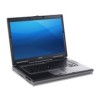Dell Precision M65 User's Guide - Page 96
Printer Problems
 |
View all Dell Precision M65 manuals
Add to My Manuals
Save this manual to your list of manuals |
Page 96 highlights
If the battery status light rapidly flashes orange, the battery may be defective. Contact Dell (see Contacting Dell). Check the battery temperature - If the battery temperature is below 0° C (32° F), the computer will not start up. Test the electrical outlet - Ensure that the electrical outlet is working by testing it with another device, such as a lamp. Check the AC adapter - Check the AC adapter cable connections. If the AC adapter has a light, ensure that the light is on. Connect the computer directly to an electrical outlet - Bypass power protection devices, power strips, and the extension cable to verify that the computer turns on. Eliminate possible interference - Turn off nearby fans, fluorescent lights, halogen lamps, or other appliances. Adjust the power properties - See Configuring Power Management Settings. Reseat the memory modules - If the computer power light turns on but the display remains blank, reinstall the memory modules (see Memory). Ensuring Sufficient Power for Your Computer Your computer is designed to use a 65-W or 90-W AC adapter. However, for optimum system performance, you should always use a 90-W adapter. Using less-powerful AC adapters, including the 65-W AC adapter, will cause you to receive a WARNING message. Docking Power Considerations Due to the extra power consumption when a computer is docked to the Dell D/Dock, normal computer operation is not possible on battery power alone. Ensure that the AC adapter is connected to your computer when the computer is docked to the Dell D/Dock. Docking While the Computer Is Running If a computer is connected to the Dell D/Dock or Dell D/Port while the computer is running, presence of the docking device is ignored until the AC adapter is connected to the computer. AC Power Loss While the Computer Is Docked If a computer loses AC power while docked to the Dell D/Dock or Dell D/Port, the computer immediately goes into low-performance mode. Printer Problems Fill out the Diagnostics Checklist (see Diagnostics Checklist) as you complete these checks. CAUTION: Before you begin any of the procedures in this section, follow the safety instructions in the Product Information Guide. NOTE: If you need technical assistance for your printer, contact the printer's manufacturer. Ensure that the printer is turned on Check the printer cable connections - l See the printer documentation for cable connection information. l Ensure that the printer cables are securely connected to the printer and the computer. Test the electrical outlet - Ensure that the electrical outlet is working by testing it with another device, such as a lamp.














